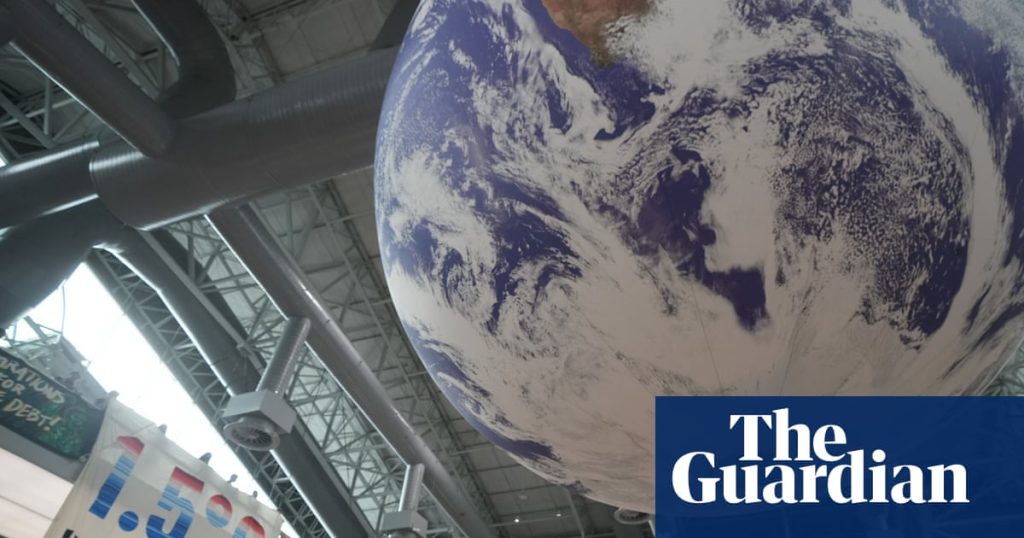Climate crisis talks look likely to stretch well into the weekend in Brazil, with countries still far apart on the crucial issues of phasing out fossil fuels and cutting carbon.
The Cop30 president, André Corrêa do Lago, urged ministers and high-ranking officials from more than 190 countries to find common ground: “We need to preserve this regime [of the Paris climate agreement] with the spirit of cooperation, not in the spirit of who is going to win or is willing to lose’” he said. “Because we know if we don’t strengthen this, everyone will lose.”
No agreement looked likely, however, on the core issue of a “transition away from fossil fuels”, with the conference split into two large blocs.
More than 80 developed and developing countries have called for the process of drawing up a roadmap for the transition to begin, which would allow all governments to pursue self-chosen measures and timetables towards the eventual goal.
Even this – derided by some civil society groups as too weak – was unacceptable to a separate group of more than 80 countries, according to Corrêa do Lago. This bloc includes Saudi Arabia, Russia and other petrostates, and some countries dependent on using fossil fuels. References to a roadmap were excised from a draft text published early on Friday morning at their insistence.
Corrêa do Lago told the Guardian on Friday: “This issue has grown in importance. But more than 80 countries have said it is a non-starter. My president has said it is a priority. But we will see, as many countries have clearly said that they do not want this at the moment.”
A fresh draft text was expected late on Friday night or early on Saturday morning in Brazil, but several people involved in the talks said it might have only minor tweaks.
If so, it will bitterly disappoint those calling for stronger language on fossil fuels and the need to limit global temperatures. One developed country said: “The Brazilians are only listening to the Arab group.”
Brazil convened ministerial discussions among all of the major regional and interest groups at the talks on Friday afternoon, as well as holding meetings with individual countries after a morning plenary meeting with all countries was inconclusive.
The European commissioner for climate, Wopke Hoekstra, said the deal on offer was so inadequate that countries may leave with no agreement.
“What is now on the table is unacceptable,” he said. “And given that we’re so far away from where we should be, it’s unfortunate to say, but we’re really facing a no-deal scenario.”
Bas Eickhout, a member of the European parliament’s delegation to Cop30, said: “With this text as it stands, no deal is better than a bad deal. Failure to reach an agreement on a roadmap to transition away from fossil fuels would not only be a big win for petrostates, but also for Trump and his hard-right allies.
“No one can seriously expect us to win the fight on the climate crisis if we don’t deal with the elephant in the room: phasing out fossil fuels.”
In a sign of the slow pace of progress, Colombia and the Netherlands announced they would hold a separate but complementary conference on the transition away from fossil fuels for high-ambition countries next year.
The planet’s most important stories. Get all the week’s environment news – the good, the bad and the essential
Privacy Notice: Newsletters may contain information about charities, online ads, and content funded by outside parties. If you do not have an account, we will create a guest account for you on theguardian.com to send you this newsletter. You can complete full registration at any time. For more information about how we use your data see our Privacy Policy. We use Google reCaptcha to protect our website and the Google Privacy Policy and Terms of Service apply.
after newsletter promotion
“We have taken this step because, simply, we cannot wait any longer,” said Tuvalu’s environment minister, Maina Talia. “The Pacific came to Cop30 demanding a survival roadmap away from fossil fuels. Yet this text does not even name the threat to our existence. This process is failing us so we will not wait.”
The climate envoy for the Marshall Islands, Tina Stege, said: “As a nation that is just two metres above sea level we know that climate action cannot wait. This roadmap is inevitable, it’s happening.”
The Guardian understands from various countries’ delegates that China is not among the countries blocking a roadmap, while India has taken a harder line by insisting developed countries bear responsibility for past greenhouse gas emissions.
A few developing countries with fossil fuel interests, including Nigeria and Sierra Leone, have backed a potential roadmap.
Also at stake is the question of how countries respond to the fact that current national climate plans, known as nationally determined contributions, would lead to about 2.5C of heating above preindustrial levels, far above the 1.5C limit target set by the Paris agreement.
One delegate from the Alliance of Small Island States said issue was critical to vulnerable countries, but the draft text contained only options to continue talking about the large gap between countries’ targets and the carbon cuts necessary to stay within 1.5C or as close to it as is now possible.
Some civil society groups blamed the rich world for creating the impasse at the talks by failing to provide enough finance to help poor countries facing climate breakdown.
Cop veteran Harjeet Singh of the Satat Sampada Climate Foundation, said: “If the current draft text is accepted here in Belém, Cop30 will go down in history as the deadliest talkshow ever produced.
“Negotiators spend days discussing what to discuss and inventing new dialogues solely to avoid the actions that matter: committing to a just transition away from fossil fuels and putting money on the table.”

